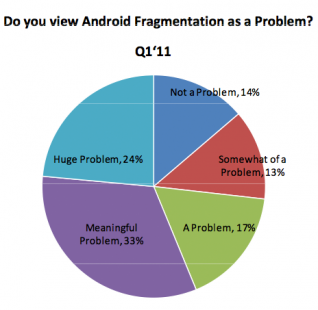87 percent of Android developers say fragmentation a problem
In a Q1 2011 survey of 250 developers conducted by analyst William Powers of Baird Research, 87 percent of Android developers responded with concerns over fragmentation, Fortune reports. Additionally, the percentage of developers who see device fragmentation as either a meaningful or huge problem increased over the last three months to 57 percent.
Developers also see store fragmentation as an issue for the Android platform. "Generally, developers seem to prefer a unified, single store experience like Apple's App Store," Baird wrote.
The survey found that 71 percent of respondents develop for Android, while 62 percent develop for Apple's iOS.
According to the report, iOS outscored competing mobile operating system platforms when it came to developer's perceptions of ease of development, app visibility and the ability to get paid. Regarding app visibility, Baird noted, "iOS continues to lead, followed by Blackberry, with Android still receiving poor marks in this category."
For its part, Google reportedly began implementing new restrictions on its Android partners last week in hopes of stemming fragmentation.
In late March, the Mountain View, Calif., search giant closed the source code to its Android 3.0 Honeycomb platform, ostensibly because the release is not designed for smartphones. The first device to feature Honeycomb, which Google touts as having been designed "from the ground up" for tablets, is the Motorola Xoom.
Apple Chief Executive Steve Jobs warned of the increasing risk of Android fragmentation last year during a quarterly earnings call. "Unlike Windows, where PCs have the same interface, Android is very fragmented. Many Android OEMs, including the two largest, HTC and Motorola, install proprietary user interfaces to differentiate themselves from the commodity Android experience. The user's left to figure it out," Jobs said.
Jobs also warned of application store fragmentation, calling them "a mess for both users and developers." "Many Android apps work only on selected handsets, or selected Android versions," he noted.
 Josh Ong
Josh Ong








 Amber Neely
Amber Neely
 Thomas Sibilly
Thomas Sibilly
 AppleInsider Staff
AppleInsider Staff
 William Gallagher
William Gallagher
 Malcolm Owen
Malcolm Owen
 Christine McKee
Christine McKee










86 Comments
Glad to hear they are realistic!
For a better, more pithy, more pungent take on the story, see this article from Fortune, "Android is a mess, say developers":http://tech.fortune.cnn.com/2011/04/...azines_fortune
AI: Please put a bit more elan into your stories, a la DED. Take a stand? Thanks.
~90%!
Enough said!
I maintain MS and now Google both with their mis-guided approach to software development have done more damage to business development than any other factor. There is the MS/google way of doing things and there is the Apple way.
Go ahead and argue amongst yourselves on whether or not the above is true!
Best
Once again, Steve was right.
Of course this is not surprising news, but if it's true that most developers prefer iOS to Android, why do significantly more of them now develop for Android than for iOS -- especially when by all accounts they stand to make more profit writing Apple coded apps? Puzzling.